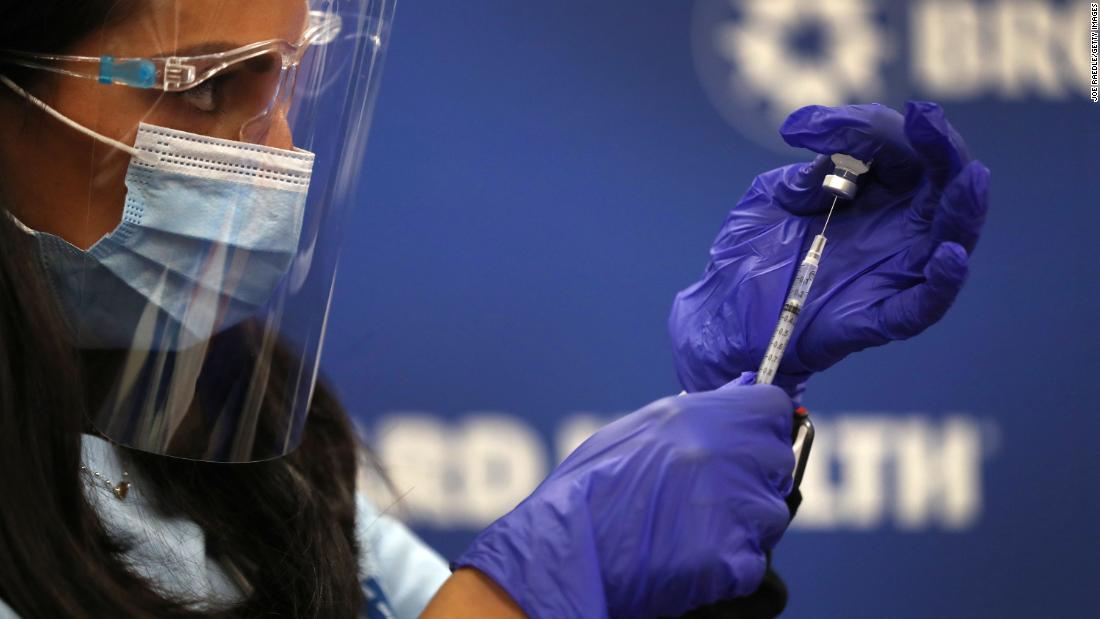
That would put those people in "Phase 1b" of allocating the vaccine nationwide.
That committee vote also included prioritizing adults ages 65 to 75, people ages 16 to 64 with high-risk medical conditions and "other essential workers" in "Phase 1c" of allocation.
"They really serve to address the current lack of vaccine supply and address those individuals with the highest risk for disease," Dr. José Romero, chair of the Advisory Committee on Immunization Practices and secretary of the Arkansas Department of Health, said about the recommendations.
The Advisory Committee on Immunization Practices met on Sunday to discuss Phases 1b and 1c of vaccine distribution.
In a previous meeting earlier this month, the group voted on Phase 1a, which advised giving the first round of vaccines to health care workers and residents of long-term care facilities.
There are two Covid-19 vaccines -- Pfizer/BioNTech's and Moderna's -- currently authorized for emergency use in the United States.
Who is an essential worker?
A work group within the advisory committee defined frontline essential workers as "workers who are in sectors essential to the functioning of society and are at substantially higher risk of exposure" to the coronavirus that causes Covid-19.
The frontline essential workers in Phase 1b include first responders, people in the education sector, those who work in food and agriculture, those in manufacturing, corrections workers, US postal service workers, public transit workers and grocery store workers.
It is estimated that there are about 30 million frontline essential workers in the United States.
The category of other essential workers in Phase 1c includes people in transportation and logistics, food service, construction and shelter and housing, finance, IT and communication, the energy sector, the media, the legal sector, public safety and water and wastewater industries.
It is estimated that there are about 57 million other essential workers in the United States.
The 'hardest' vote
"This is without doubt the hardest vote that I have taken in my six and a half years on the committee," said Romero.
"I am confident that we have arrived at this by examining the data thoroughly, and that what we are providing -- as has been stated before -- the ultimate decision will be at a local level. But what we are providing governors and health officials with is a framework, which is supported by evidence," Romero said.
He voted "yes" on the proposed Phase 1b and 1c recommendations.
Committee member Dr. Peter Szilagyi, who also voted "yes," agreed that the decision was difficult.
"I truly wish everyone could get the vaccine today, and I know high-risk individuals are not included in Phase 1b," said Szilagyi, who is in the department of pediatrics at the University of California at Los Angeles. "But over several months, as vaccine supply ramps up, every American will have access to these safe and effective vaccines."
The one "no" vote came from Dr. Henry Bernstein, who is a professor of pediatrics with the Zucker School of Medicine at Hofstra. Bernstein explained that he voted no because he felt that the science about Covid-19 morbidity and mortality is similar between the 65-to-74 group and the 75-and-up group.
"Therefore, inclusion of the 65-to-74-year-old group in Phase 1b made more sense to me," Bernstein said.
The need for funding
In their vote, most of the committee members also asked the government to fully fund state and local health departments vaccination programs.
"The fact that the state and local health departments have not been funded for vaccination program, especially in the context of the billions of dollars that funded the extremely successful program to develop vaccines is really appalling," said Dr. Beth Bell, who voted "yes" on the proposal.
"I'm just one person, but I would just like to say, again, that I hope that the government will address this discrepancy, without which I think it's going to be very difficult for us to be successful," said Bell, a clinical professor in the department of global health at the University of Washington.
The advisory committee's recommendations for Phase 1b and 1c go to the CDC next for final acceptance.
"and" - Google News
December 21, 2020 at 06:53AM
https://ift.tt/3rh2rQr
Who gets Covid-19 vaccine next? Older adults and 'frontline essential workers,' CDC advisers recommend - CNN
"and" - Google News
https://ift.tt/35sHtDV
https://ift.tt/2ycZSIP
And
Bagikan Berita Ini














0 Response to "Who gets Covid-19 vaccine next? Older adults and 'frontline essential workers,' CDC advisers recommend - CNN"
Post a Comment